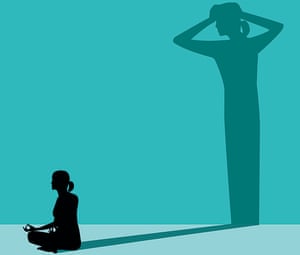Dawn Foster in The Guardian

Illustration: Nick Lowndes for the Guardian
I am sitting in a circle in a grey, corporate room with 10 housing association employees – administrators, security guards, cleaners – eyes darting about nervously. We are asked to eat a sandwich in silence. To think about every taste and texture, every chewing motion and bite. Far from being relaxed, I feel excruciatingly uncomfortable and begin to wonder if my jaw is malfunctioning. I’m here to write about a new mindfulness initiative, and since I’ve never to my knowledge had any mental health issues and usually thrive under stress, I anticipate a straightforward, if awkward, experience.
Then comes the meditation. We’re told to close our eyes and think about our bodies in relation to the chair, the floor, the room: how each limb touches the arms, the back, the legs of the seat, while breathing slowly. But there’s one small catch: I can’t breathe. No matter how fast, slow, deep or shallow my breaths are, it feels as though my lungs are sealed. My instincts tell me to run, but I can’t move my arms or legs. I feel a rising panic and worry that I might pass out, my mind racing. Then we’re told to open our eyes and the feeling dissipates. I look around. No one else appears to have felt they were facing imminent death. What just happened?
For days afterwards, I feel on edge. I have a permanent tension headache and I jump at the slightest unexpected noise. The fact that something seemingly benign, positive and hugely popular had such a profound effect has taken me by surprise.
Mindfulness, the practice of sitting still and focusing on your breath and thoughts, has surged in popularity over the last few years, with a boom in apps, online courses, books and articles extolling its virtues. It can be done alone or with a guide (digital or human), and with so much hand-wringing about our frenetic, time-poor lifestyles and information overload, it seems to offer a wholesome solution: a quiet port in the storm and an opportunity for self-examination. The Headspace app, which offers 10-minute guided meditations on your smartphone, has more than three million users worldwide and is worth over £25m. Meanwhile, publishers have rushed to put out workbooks and guides to line the wellness shelves in bookshops.
I am sitting in a circle in a grey, corporate room with 10 housing association employees – administrators, security guards, cleaners – eyes darting about nervously. We are asked to eat a sandwich in silence. To think about every taste and texture, every chewing motion and bite. Far from being relaxed, I feel excruciatingly uncomfortable and begin to wonder if my jaw is malfunctioning. I’m here to write about a new mindfulness initiative, and since I’ve never to my knowledge had any mental health issues and usually thrive under stress, I anticipate a straightforward, if awkward, experience.
Then comes the meditation. We’re told to close our eyes and think about our bodies in relation to the chair, the floor, the room: how each limb touches the arms, the back, the legs of the seat, while breathing slowly. But there’s one small catch: I can’t breathe. No matter how fast, slow, deep or shallow my breaths are, it feels as though my lungs are sealed. My instincts tell me to run, but I can’t move my arms or legs. I feel a rising panic and worry that I might pass out, my mind racing. Then we’re told to open our eyes and the feeling dissipates. I look around. No one else appears to have felt they were facing imminent death. What just happened?
For days afterwards, I feel on edge. I have a permanent tension headache and I jump at the slightest unexpected noise. The fact that something seemingly benign, positive and hugely popular had such a profound effect has taken me by surprise.
Mindfulness, the practice of sitting still and focusing on your breath and thoughts, has surged in popularity over the last few years, with a boom in apps, online courses, books and articles extolling its virtues. It can be done alone or with a guide (digital or human), and with so much hand-wringing about our frenetic, time-poor lifestyles and information overload, it seems to offer a wholesome solution: a quiet port in the storm and an opportunity for self-examination. The Headspace app, which offers 10-minute guided meditations on your smartphone, has more than three million users worldwide and is worth over £25m. Meanwhile, publishers have rushed to put out workbooks and guides to line the wellness shelves in bookshops.
Large organisations such as Google, Apple, Sony, Ikea, the Department of Healthand Transport for London have adopted mindfulness or meditation as part of their employee packages, claiming it leads to a happier workforce, increased productivity and fewer sick days. But could such a one-size-fits-all solution backfire in unexpected ways?
Even a year later, recalling the sensations and feelings I experienced in that room summons a resurgent wave of panic and tightness in my chest. Out of curiosity, I try the Headspace app, but the breathing exercises leave me with pins and needles in my face and a burgeoning terror. “Let your thoughts move wherever they please,” the app urges. I just want it to stop. And, as I discovered, I’m not the only person who doesn’t find mindfulness comforting.
Claire, a 37-year-old in a highly competitive industry, was sent on a three-day mindfulness course with colleagues as part of a training programme. “Initially, I found it relaxing,” she says, “but then I found I felt completely zoned out while doing it. Within two or three hours of later sessions, I was starting to really, really panic.” The sessions resurfaced memories of her traumatic childhood, and she experienced a series of panic attacks. “Somehow, the course triggered things I had previously got over,” Claire says. “I had a breakdown and spent three months in a psychiatric unit. It was a depressive breakdown with psychotic elements related to the trauma, and several dissociative episodes.”
Four and a half years later, Claire is still working part-time and is in and out of hospital. She became addicted to alcohol, when previously she was driven and high-performing, and believes mindfulness was the catalyst for her breakdown. Her doctors have advised her to avoid relaxation methods, and she spent months in one-to-one therapy. “Recovery involves being completely grounded,” she says, “so yoga is out.”
Research suggests her experience might not be unique. Internet forums abound with people seeking advice after experiencing panic attacks, hearing voices or finding that meditation has deepened their depression after some initial respite. In their recent book, The Buddha Pill, psychologists Miguel Farias and Catherine Wikholm voice concern about the lack of research into the adverse effects of meditation and the “dark side” of mindfulness. “Since the book’s been published, we’ve had a number of emails from people wanting to tell us about adverse effects they have experienced,” Wikholm says. “Often, people have thought they were alone with this, or they blamed themselves, thinking they somehow did it wrong, when actually it doesn’t seem it’s all that uncommon.”
One story in particular prompted Farias to look further into adverse effects. Louise, a woman in her 50s who had been practising yoga for 20 years, went away to a meditation retreat. While meditating, she felt dissociated from herself and became worried. Dismissing it as a routine side-effect of meditation, Louise continued with the exercises. The following day, after returning home, her body felt completely numb and she didn’t want to get out of bed. Her husband took her to the doctor, who referred her to a psychiatrist. For the next 15 years she was treated for psychotic depression.
Farias looked at the research into unexpected side-effects. A 1992 study by David Shapiro, a professor at the University of California, Irvine, found that 63% of the group studied, who had varying degrees of experience in meditation and had each tried mindfulness, had suffered at least one negative effect from meditation retreats, while 7% reported profoundly adverse effects including panic, depression, pain and anxiety. Shapiro’s study was small-scale; several research papers, including a 2011 study by Duke University in North Carolina, have raised concerns at the lack of quality research on the impact of mindfulness, specifically the lack of controlled studies.
Farias feels that media coverage inflates the moderate positive effects of mindfulness, and either doesn’t report or underplays the downsides. “Mindfulness can have negative effects for some people, even if you’re doing it for only 20 minutes a day,” Farias says. “It’s difficult to tell how common [negative] experiences are, because mindfulness researchers have failed to measure them, and may even have discouraged participants from reporting them by attributing the blame to them.”
Kate Williams, a PhD researcher in psychiatry at the University of Manchester and a mindfulness teacher, says negative experiences generally fall into one of two categories. The first is seen as a natural emotional reaction to self-exploration. “What we learn through meditation is to explore our experiences with an open and nonjudgmental attitude, whether the experience that arises is pleasant, unpleasant or neutral,” she says.
The second, Williams says, is more severe and disconcerting: “Experiences can be quite extreme, to the extent of inducing paranoia, delusions, confusion, mania or depression.” After years of training, research and practice, her own personal meditation has included some of these negative experiences. “Longer periods of meditation have at times led me to feel a loss of identity and left me feeling extremely vulnerable, almost like an open wound,” Williams says. As an experienced mindfulness teacher, however, she says she is able to deal with these negative experiences without lasting effect.
Rachel, a 34-year-old film-maker from London, experimented with mindfulness several years ago. An old school friend who had tried it attempted to warn her off. “He said, ‘It’s hardcore – you’ll go through things you don’t want to go through and it might not always be positive.’ I suppose sitting with yourself is hard, especially when you’re in a place where you don’t really like yourself. Meditationcan’t ‘fix’ anyone. That’s not what it’s for.”
After a few months of following guided meditations, and feeling increasingly anxious, Rachel had what she describes as a “meltdown” immediately after practising some of the techniques she’d learned; the relationship she was in broke down. “That’s the horrible hangover I have from this: instead of having a sense of calm, I overanalyse and scrutinise everything. Things would run round in my mind, and suddenly I’d be doing things that were totally out of character, acting very, very erratically. Having panic attacks that would restrict my breathing and, once, sent me into a blackout seizure on the studio floor that involved an ambulance trip to accident and emergency.” Rachel has recovered to some extent; she experiences similar feelings on a lower level even today, but has learned to recognise the symptoms and take steps to combat them.

Illustration: Nick Lowndes for the Guardian
So are employers and experts right to extol the virtues of mindfulness? According to Will Davies, senior lecturer at Goldsmiths and author of The Happiness Industry, our mental health has become a money-making opportunity. “The measurement of our mental and emotional states at work is advancing rapidly at the moment,” he says, “and businesses are increasingly aware of the financial costs that stress, depression and anxiety saddle them with.”
Rather than removing the source of stress, whether that’s unfeasible workloads, poor management or low morale, some employers encourage their staff to meditate: a quick fix that’s much cheaper, at least in the short term. After all, it’s harder to complain that you’re under too much stress at work if your employer points out that they’ve offered you relaxation classes: the blame then falls on the individual. “Mindfulness has been grabbed in recent years as a way to help people cope with their own powerlessness in the workplace,” Davies says. “We’re now reaching the stage where mandatory meditation is being discussed as a route to heightened productivity, in tandem with various apps, wearable devices and forms of low-level employee surveillance.”
One former Labour backbencher, Chris Ruane, recently proposed meditation for civil servants, on the basis that it would cut Whitehall costs by lowering sick leave through stress, rather than making the workplace and jobs less stressful in the first place. “The whole agenda is so fraught with contradictions, between its economic goals and its supposedly spiritual methods,” Davies argues. “It’s a wonder anyone takes it seriously at all.”
Mindfulness has also been adopted by the NHS, with many primary care trusts offering and recommending the practice in lieu of cognitive behavioural therapy (CBT). “It fits nicely with the Nutribullet-chugging, clean-eating crowd, because it doesn’t involve any tablets,” says Bethan, a mental health nurse working in east London. “My main problem with it is that it’s just another word for awareness.”
Over the past few years, Bethan has noticed mindfulness mentioned or recommended increasingly at work, and says many colleagues have been offered sessions and training as part of their professional development. But the move towards mindfulness delivered through online or self-help programmes isn’t for everyone. “It’s fine, but realising you have depression isn’t the same as tackling it,” she says. “I don’t see it as any different from the five-a-day campaign: we know what we should be eating, but so many of us don’t do it. We know that isolating ourselves isn’t helpful when we feel blue, but we still do that.”
Part of the drive is simple cost-cutting. With NHS budgets squeezed, resource-intensive and diverse therapies that involve one-on-one consultations are far more expensive to dispense than online or group therapies such as mindfulness. A CBT course costs the NHS £950 per participant on average, while mindfulness-based cognitive therapy, because it’s delivered in a group, comes in at around £300 a person. “It’s cheap, and it does make people think twice about their choices, so in some respects it’s helpful,” Bethan says.
But in more serious cases, could it be doing more harm than good? Florian Ruths has researched this area for 10 years, as clinical lead for mindfulness-based therapy in the South London and Maudsley NHS foundation trust. He believes it is possible to teach yourself mindfulness through apps, books or online guides. “For most people, I think if you’re not suffering from any clinical issues, or illness, or from stress to a degree that you’re somewhat disabled, it’s fine,” he says. “We talk about illness as disability, and disability may arise through sadness, it may arise through emotional disturbance, like anxiety. Then, obviously, it becomes a different ballgame, and it would be good to have a guided practice to take you through it.” This runs counter to the drive towards online mindfulness apps, delivered without supervision, and with little to no adaptation to individual needs or problems.
But for Ruths, the benefits outweigh the risk of unusual effects. “If we exercise, we live longer, we’re slimmer, we’ve got less risk of dementia, we’re happier and less anxious,” he says. “People don’t talk about the fact that when you exercise, you are at a natural risk of injuring yourself. When people say in the new year, ‘I’m going to go to the gym’ – out of 100 people who do that, about 20 will injure themselves, because they haven’t been taught how to do it properly, or they’ve not listened to their bodies. So when you’re a responsible clinician or GP, you tell someone to get a good trainer.”
Certain mental health problems increase the risk of adverse effects from mindfulness. “If you have post-traumatic stress disorder, there is a certain chance that you may find meditation too difficult to do, as you may be re-experiencing traumatic memories,” Ruths says. “Once again, it’s about having experienced trainers to facilitate that. We’ve seen some evidence that people who’ve got bipolar vulnerability may struggle, but we need to keep in mind that it may be accidental, or it may be something we don’t know about yet.”
Of course, people may not know they have a bipolar vulnerability until they try mindfulness. Or they might have repressed the symptoms of post-traumatic stress disorder, only for these to emerge after trying the practice.
How can an individual gauge whether they’re likely to have negative side-effects? Both Farias and Ruths agree there isn’t a substantial body of evidence yet on how mindfulness works, or what causes negative reactions. One of the reasons is obvious: people who react badly tend to drop out of classes, or stop using the app or workbook; rather than make a fuss, they quietly walk away. Part of this is down to the current faddishness of mindfulness and the way it’s marketed: unlike prescribed psychotherapy or CBT, it’s viewed as an alternative lifestyle choice, rather than a powerful form of therapy.
Claire is clear about how she feels mindfulness should be discussed and delivered: “A lot of the people who are trained in mindfulness are not trained in the dangers as well as the potential benefits,” she says. “My experience of people who teach it is that they don’t know how to help people if it goes too far.”
There is currently no professionally accredited training for mindfulness teachers, and nothing to stop anyone calling themselves a mindfulness coach, though advocates are calling for that to change. Finding an experienced teacher who comes recommended, and not being afraid to discuss negative side-effects with your teacher or GP, means you’re far more likely to enjoy and benefit from the experience.
As both Claire and I have found, there are alternative relaxation methods that can keep you grounded: reading, carving out more time to spend with friends, and simply knowing when to take a break from the frenetic pace of life. Meanwhile, Claire’s experience has encouraged her to push for a better understanding of alternative therapies. “No one would suggest CBT was done by someone who wasn’t trained,” she says. “I’d like to see a wider discussion about what mindfulness is – and on what the side-effects can be.”

